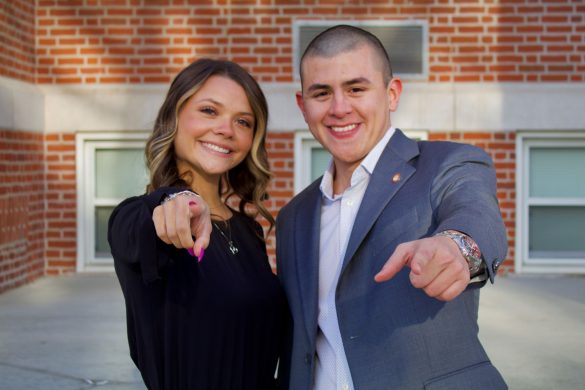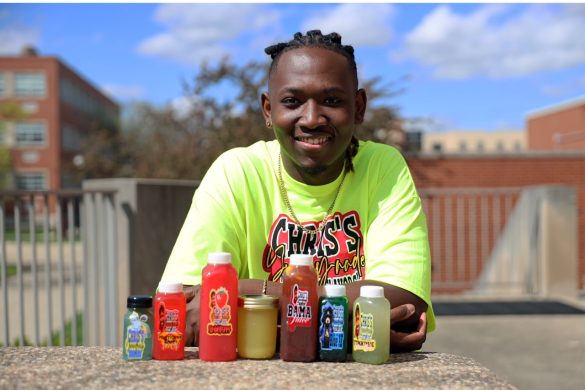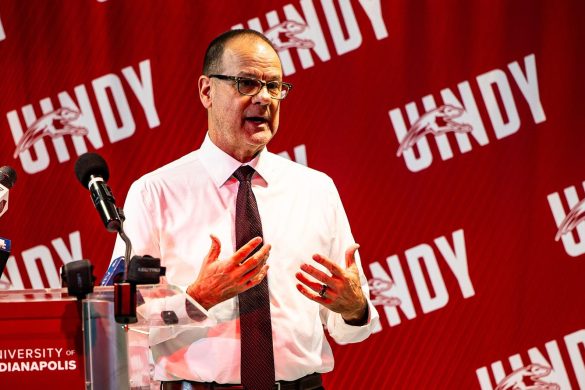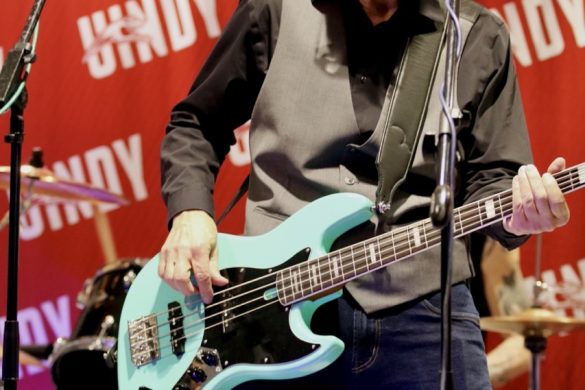April 2019 marks the 18th anniversary of Sexual Assault Awareness Month. Sexual Assault Awareness Month is dedicated to acknowledging, recognizing and attempting to reduce and eliminate sexual assault situations with various events and conversations, being held both across the country and internationally, according to University of Indianapolis Director of Student Support and Title IX Coordinator Anne Moelk. This includes UIndy, which hosted several events focused on consent, which ties into this year’s theme of “I Ask.” The National Sexual Violence Resource Center said: “The campaign theme, ‘I Ask,’ champions the message that asking for consent is a healthy, normal and necessary part of everyday interactions.”
 UIndy is holding seven different events or themed days throughout the course of the month. They kicked off with the Day of Action, where people were encouraged to wear teal to show their support. Other events included events focused on the LGBTQ community, body positivity, self-defense and male assault victims. These events focus on various different communities that are affected by sexual assault.
UIndy is holding seven different events or themed days throughout the course of the month. They kicked off with the Day of Action, where people were encouraged to wear teal to show their support. Other events included events focused on the LGBTQ community, body positivity, self-defense and male assault victims. These events focus on various different communities that are affected by sexual assault.
“We have members of all of those groups within our community,” Moelk said. “And so I think it’s a matter of inclusion. You want to have inclusion on the good things and… opportunities for self protection and opportunities for resources, if you do become a victim, should also be inclusive. And so creating a space where everyone recognizes that, you know, they too deserve to be safe and happy is important.”
Senior visual communication design major and PRIDE Co-Chair OJ Moore said it is important that Sexual Assault Awareness Month happens because it helps bring light to the ever-present issue. Conversations about things like sexual assault and harassment can be difficult and uncomfortable to engage in, but Moelk said she relishes the opportunity to have conversations because that is a part of college and a part of life and it is important to be educated.
Conversations about sexual assault can happen outside of larger organized events too and should be something students are able to talk about with their friends, according to Moelk. She recently bought a conversation-starting game, that students can check out from her office called “Sexversations,” which has cards with various topics and questions aimed to get sometimes difficult conversations started.
Moelk also suggested using opportunities to naturally bring up the topic in conversation. For example, if someone is watching a movie with friends and they see a situation occur, they can start a conversation about what they would do if something like that happened to them or someone they know. Online movements like the #MeToo movement are also a way people can, and have started talking about sexual assault.
“I think it’s good [talking about sexual assault] because people don’t feel isolated as victims, as survivors,” Moelk said. “They realize that, unfortunately, they are not alone in these scenarios. And I say unfortunately, because obviously we don’t want people to be victims, survivors, but it’s a good thing for those who are to know that they have a community that they can fall back onto. And so having that conversation allows people to feel more comfortable bringing their stories to the front. I think the conversation continuing is a good thing because it lets perpetrators know that it’s not going away. It lets people know that, you know, we as a community are paying attention to this kind of stuff now and your bullying and your coercion and your hopes, that these types of things we’ll just fade and go away until the next thing comes up. That’s not happening.”

Moelk has information in her office, located in Schwitzer 210, about sexual assault and harassment and said her door is open if students would like to talk or report something. She also said the Counseling Center offers support for victims, and UIndy has a new group called PAWS which is made up of peer leaders and supporters. She said if a student does not feel comfortable going to her and would rather go to one of their peers, these people have been trained and know the resources that they can refer victims to. Moore also stressed that if someone has a friend who has had something like this happen to them, it is important to be there for them.
“If somebody is going through this and you know them personally, that doesn’t turn you into social justice warrior,” Moore said. “That doesn’t make it your responsibility to tackle this huge issue head on and publicly. You are completely allowed to just be there for your one friend at that one time, and that makes a difference to that person.”
April 3 — PRIDE Discussion
 PRIDE hosted a discussion about sexual assault in the LGBTQ community in collaboration with Moelk. She said the event aimed to talk about the differences within the LGBTQ community and sexual assault and to make sure that students know about the resources available to them on campus. Moelk said that it is more common for sexual assault to happen to LGBTQ youth and that they are less likely to report it. Moore said that because of the alarming statistics about sexual assault in the LGBTQ community, they wanted to make sure that their members knew about the resources offered on campus.
PRIDE hosted a discussion about sexual assault in the LGBTQ community in collaboration with Moelk. She said the event aimed to talk about the differences within the LGBTQ community and sexual assault and to make sure that students know about the resources available to them on campus. Moelk said that it is more common for sexual assault to happen to LGBTQ youth and that they are less likely to report it. Moore said that because of the alarming statistics about sexual assault in the LGBTQ community, they wanted to make sure that their members knew about the resources offered on campus.
 “We were trying to talk to our members about [it]. As a minority in the world, I think we have this mentality, to an extent, that when we find someone that’s like us, we need [to] marry them and take whatever good and bad that comes with it. And that’s not excusable for being sexually assaulted and harassed,” junior criminal justice major and Treasurer of PRIDE Tiger Castell said. “We don’t have to put up with it as being our only option. We’re still very much human and that we need to know that it’s okay to stand up for ourselves and to also help others.”
“We were trying to talk to our members about [it]. As a minority in the world, I think we have this mentality, to an extent, that when we find someone that’s like us, we need [to] marry them and take whatever good and bad that comes with it. And that’s not excusable for being sexually assaulted and harassed,” junior criminal justice major and Treasurer of PRIDE Tiger Castell said. “We don’t have to put up with it as being our only option. We’re still very much human and that we need to know that it’s okay to stand up for ourselves and to also help others.”
April 4 — Jess Weiner Events
On April 4, social entrepreneur and CEO of Talk To Jess, a consulting firm that works with brands to help better represent people in their media, marketing and advertising, Jess Weiner came to campus to hold a workshop and lecture open to student, staff, faculty and community members.
 The workshop was called “The Business of Being You” and gave attendees the opportunity to figure out their personal mission, values and vision. “The Confidence Myth” was a lecture she gave where she shared her story of social activism and discussed how anyone could get involved with a cause they cared about.
The workshop was called “The Business of Being You” and gave attendees the opportunity to figure out their personal mission, values and vision. “The Confidence Myth” was a lecture she gave where she shared her story of social activism and discussed how anyone could get involved with a cause they cared about.
Moelk said that while these events were not originally intended to be a part of the consent events happening on campus, her visit coincided and fit into the programming of the events as well.
“I think her message of body positivity and empowerment really goes along with what we’re trying to do in terms of educating people about having confidence in the ability to speak up for themselves, and to perhaps get themselves out of the situation that might turn into a sexual assault scenario,” Moelk said.
April 10 — Can I Give You a Kiss?
 ‘Can I Give You A Kiss’ focused on distributing information about consent and the importance of always asking for consent before engaging in any kind of physical interaction. Moelk sat at a table in Schwitzer Student Center and asked passersby if they wanted a kiss, a Hershey’s Kiss. She said that this event is an example of a way to bring up a difficult subject like sexual assault or consent and make it easier to talk about.
‘Can I Give You A Kiss’ focused on distributing information about consent and the importance of always asking for consent before engaging in any kind of physical interaction. Moelk sat at a table in Schwitzer Student Center and asked passersby if they wanted a kiss, a Hershey’s Kiss. She said that this event is an example of a way to bring up a difficult subject like sexual assault or consent and make it easier to talk about.
“Using something as kind of silly as, ‘Hey, can I give you a kiss?’ And then handing someone a chocolate piece of chocolate lightens the mood,” Moelk said. “But also is a nice analogy to the real thing of if I wanted to give you an actual kiss, a physical kiss, I should ask you that too. I’m not going to throw chocolate at you. And I shouldn’t just attack you with kisses unless you have given me consent. And so, you know, trying to lighten the mood I think is one way to do that.”
The National Sexual Violence Resource Center has more information on consent. The organization said consent is important because: “You’ll feel more confident about what you’re doing, and your partner will feel comfortable getting close to you.”
April 13 — Mac Attack
 Mac Attack was sponsored by the Campus Program Board and gave attendees a chance to learn self-defense skills, while also enjoying macaroni and cheese. The event began with an informational session and trivia game on Title IX and UIndy’s resources lead by Executive Administrative Assistant and Deputy Title IX Coordinator Brittany Gray. Campus Police Officer Enrique Nunez then lead a self-defense demonstration with two cadets.
Mac Attack was sponsored by the Campus Program Board and gave attendees a chance to learn self-defense skills, while also enjoying macaroni and cheese. The event began with an informational session and trivia game on Title IX and UIndy’s resources lead by Executive Administrative Assistant and Deputy Title IX Coordinator Brittany Gray. Campus Police Officer Enrique Nunez then lead a self-defense demonstration with two cadets.
“More than anything I found that accurately training self-defense gives you a good context for what you’re trying to accomplish,” Nunez said. “Most people that haven’t trained don’t actually know what they’re training to do and a lot of that is from Hollywood. You might think you’re training to do something super flashy to keep yourself safe, [but] it might be something as simple as giving your attacker your car keys and walking away with your life. If you know how to defend yourself, you’re more likely to make the right decisions. I think that’s the benefit of training.”
April 18 — Retaking Our Story
Tim Mousseau will be speaking on campus in UIndy Hall A at 9 p.m. about reframing the sexual assault conversation. Mousseau is a male survivor of sexual assault and subsequent sexual harassment who has made it his mission to end sexual violence in every community, according to his website. Moelk said he will be approaching sexual assault from the male victim’s perspective and putting an emphasis on men participating in and promoting sexual assault awareness. She also said male victims are the least likely to report sexual assault because of social norms, so the event will also focus on how men can talk about these issues as victims.
 “As a speaker with personal stakes in these topics, these issues are close to my heart, and I know the personal experience is sadly all too familiar for many.…” Mousseau said on his website. “I share my personal experiences as a survivor and with sexual harassment to connect to vulnerably, as humans. I share original research, data and experience to provoke action with proven processes.”
“As a speaker with personal stakes in these topics, these issues are close to my heart, and I know the personal experience is sadly all too familiar for many.…” Mousseau said on his website. “I share my personal experiences as a survivor and with sexual harassment to connect to vulnerably, as humans. I share original research, data and experience to provoke action with proven processes.”
April 24 — Denim Day
On Denim Day, students, faculty and staff are requested to wear denim to raise awareness of sexual assault and rape. It will be the 20th Annual International Denim Day run by Peace Over Violence. According to denimdayinfo.org, millions of people around the world wear jeans to promote this campaign.
 “The campaign began after a ruling by the Italian Supreme Court where a rape conviction was overturned because the justices felt that since the victim was wearing tight jeans she must have helped the person who raped her remove her jeans, thereby implying consent,” the website said. “The following day, the women in the Italian Parliament came to work wearing jeans in solidarity with the victim. Peace Over Violence developed the Denim Day campaign in response to this case and the activism surrounding it. Since then, wearing jeans on Denim Day has become a symbol of protest against erroneous and destructive attitudes about sexual harassment, abuse, assault and rape.”
“The campaign began after a ruling by the Italian Supreme Court where a rape conviction was overturned because the justices felt that since the victim was wearing tight jeans she must have helped the person who raped her remove her jeans, thereby implying consent,” the website said. “The following day, the women in the Italian Parliament came to work wearing jeans in solidarity with the victim. Peace Over Violence developed the Denim Day campaign in response to this case and the activism surrounding it. Since then, wearing jeans on Denim Day has become a symbol of protest against erroneous and destructive attitudes about sexual harassment, abuse, assault and rape.”
Information in text bubbles from National Sexual Violence Resource Center and National Center for Transgender Equality.








